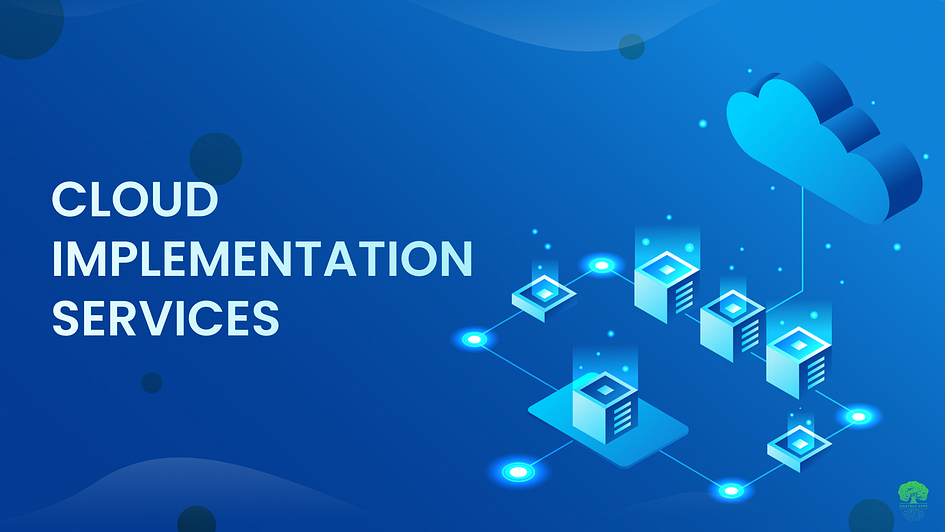Cloud Implementation Services: What Is It and How to Choose the Right Cloud Partner

Introduction:
In the ever-evolving landscape of technology, businesses are increasingly turning to cloud solutions to streamline their operations, enhance scalability, and drive innovation. Cloud implementation services play a crucial role in helping organizations migrate their operations to the cloud seamlessly. However, choosing the right cloud partner is a decision that requires careful consideration. In this blog, we will explore what cloud implementation services entail and provide insights into the essential factors to consider when selecting the right cloud partner for your business.
Understanding Cloud Implementation Services:
Cloud implementation services involve the process of transitioning an organization’s data, applications, and infrastructure from on-premises systems to cloud-based solutions. This migration enables businesses to leverage the advantages of the cloud, such as improved flexibility, cost-efficiency, and accessibility. Cloud implementation services encompass a range of activities, including assessment, planning, migration, and ongoing support.
Key Components of Cloud Implementation Services:
- Assessment: Before embarking on a cloud migration journey, a thorough assessment of the existing infrastructure and business requirements is essential. This involves evaluating the current state of applications, data, and systems to determine their compatibility with cloud environments. A comprehensive assessment helps in identifying potential challenges and developing a tailored migration strategy.
- Planning: Once the assessment is complete, the next step is to create a detailed migration plan. This plan outlines the sequence of migration, identifies dependencies between applications, and establishes a timeline for the entire process. A well-crafted plan minimizes disruptions to business operations and ensures a smooth transition to the cloud.
- Migration: The migration phase involves moving applications, data, and workloads to the cloud environment. This process requires careful execution to avoid data loss, downtime, or performance issues. A reliable cloud implementation partner employs best practices and utilizes advanced tools to facilitate a seamless migration with minimal impact on day-to-day business activities.
- Optimization: Post-migration, ongoing optimization is crucial to ensure that the cloud environment is aligned with the evolving needs of the business. This involves fine-tuning configurations, optimizing resource utilization, and implementing best practices to maximize the benefits of the cloud.
- Support and Maintenance: Continuous support and maintenance are vital for the long-term success of cloud implementations. A reputable cloud partner provides ongoing monitoring, troubleshooting, and updates to address any issues promptly. This ensures that the cloud infrastructure remains secure, efficient, and aligned with the organization’s objectives.
Choosing the Right Cloud Partner:
Selecting the right cloud partner is a critical decision that can significantly impact the success of your cloud implementation. Here are key factors to consider:
- Expertise and Experience: Look for a cloud service provider with a proven track record and extensive experience in cloud implementation. Assess their expertise in handling migrations for businesses similar to yours and inquire about their success stories.
- Comprehensive Services: Choose a cloud partner that offers end-to-end services, from initial assessment and planning to migration, optimization, and ongoing support. A comprehensive approach ensures a holistic and seamless cloud implementation process.
- Security Measures: Security is a top priority in the cloud environment. Ensure that your cloud partner has robust security measures in place, including data encryption, access controls, and compliance with industry regulations. Request information on their security protocols and certifications.
- Scalability and Flexibility: The ideal cloud partner should provide solutions that can scale with your business growth. Evaluate their ability to accommodate changing requirements and ensure that the chosen cloud platform supports the scalability and flexibility your organization needs.
- Cost Management: Cloud implementation should bring cost savings and efficiency. A reliable partner helps you understand the cost implications, provides transparent pricing models, and assists in optimizing resources to prevent unnecessary expenses.
- Client References and Testimonials: Seek client references and testimonials to gain insights into the experiences of other businesses that have partnered with the cloud service provider. A reputable partner should be willing to share success stories and references.
- Support and SLAs: Assess the level of support offered by the cloud partner. Understand the service level agreements (SLAs) regarding response times, issue resolution, and overall support. A responsive support system is crucial for maintaining the health and performance of your cloud environment.
Conclusion:
Cloud implementation services are pivotal for organizations seeking to harness the benefits of cloud computing. By understanding the key components of these services and carefully selecting the right cloud partner, businesses can ensure a successful migration that aligns with their goals and enhances overall operational efficiency. As technology continues to advance, choosing a reliable and experienced cloud partner becomes a strategic decision that sets the foundation for future success in the digital landscape.


Comments
Post a Comment